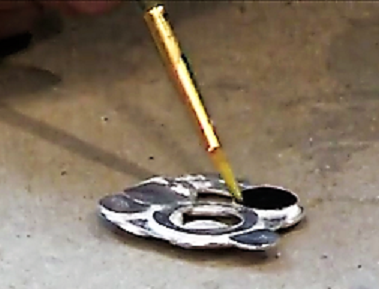Is this A trial kokoshnik, 1898 Russian Silver Hallmark?
-
wesleytyler
- Posts: 14
- Joined: Fri Dec 29, 2017 1:27 am
- Location: Myrtle Beach SC
- Contact:
Is this A trial kokoshnik, 1898 Russian Silver Hallmark?
Hello,
Thanks for taking time to read this, i got a lot of "i think " Russian silver and i trying to tell what is what.
Is this A trial kokoshnik, 1898 Russian Silver Hallmark?
https://photos.app.goo.gl/D3KRgDQYT8gL9gIj1
Thanks very much
Wes Tyler
Thanks for taking time to read this, i got a lot of "i think " Russian silver and i trying to tell what is what.
Is this A trial kokoshnik, 1898 Russian Silver Hallmark?
https://photos.app.goo.gl/D3KRgDQYT8gL9gIj1
Thanks very much
Wes Tyler
-
wesleytyler
- Posts: 14
- Joined: Fri Dec 29, 2017 1:27 am
- Location: Myrtle Beach SC
- Contact:
Re: Is this A trial kokoshnik, 1898 Russian Silver Hallmark?
oops here are all the photos https://photos.app.goo.gl/WEqhiezWCKLXc16F3
Re: Is this A trial kokoshnik, 1898 Russian Silver Hallmark?
First of all, it is not kokosnik marks. or at least not visible. Secondly, they look Russian, but...? Unfortunately, you have cropped the marks too hard. Please show a picture where all marks on the spoon's stem are visible. If there are no more marks that the shown ones, the spoons are of dubious origin.
Re: Is this A trial kokoshnik, 1898 Russian Silver Hallmark?
Hi,
Fully agree with Qrt.S. There are pros and cons.Spoons depict Kremlin in niello and look authentic but this is one of the cases with a discrepancy between ``how it`s made`` and the marks.
What`s ``trial kokoshnik?``
Even with limited space on stems there was always kokoshnik beside maker`s mark.Something like this:
(Or it`s me avoiding improperly marked items).
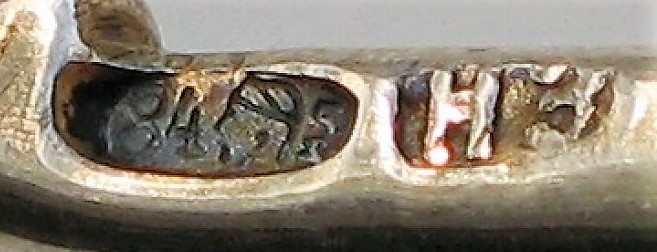
Regards
Fully agree with Qrt.S. There are pros and cons.Spoons depict Kremlin in niello and look authentic but this is one of the cases with a discrepancy between ``how it`s made`` and the marks.
What`s ``trial kokoshnik?``
Even with limited space on stems there was always kokoshnik beside maker`s mark.Something like this:
(Or it`s me avoiding improperly marked items).

Regards
Re: Is this A trial kokoshnik, 1898 Russian Silver Hallmark?
I believe wesleytyler refers to the three element "troinik" i. e. "triple". Actually there are three elements in the kokoshnik hallmark too, the fineness 1, the head 2 and the assayer's initials 3. Nevertheless, let's wait for wesleytyler to come up with better pictures of the marks.
Re: Is this A trial kokoshnik, 1898 Russian Silver Hallmark?
Hi Qrt.S,
Although most of us do not open links, the link provided by Wesley enables you to click on the images and super enhance this image to reveal all details.
https://photos.app.goo.gl/WEqhiezWCKLXc16F3
Conclusion the marks look rubbed; 84 and CC and in my opinion not correct Russian nor kokoshnik.
Best,
Peter
Although most of us do not open links, the link provided by Wesley enables you to click on the images and super enhance this image to reveal all details.
https://photos.app.goo.gl/WEqhiezWCKLXc16F3
Conclusion the marks look rubbed; 84 and CC and in my opinion not correct Russian nor kokoshnik.
Best,
Peter
Re: Is this A trial kokoshnik, 1898 Russian Silver Hallmark?
Hi wesleytyler -
Some striking details are immediately apparent:
The socalled "church"niello spoons consist always of 6 (12) different churches! On your spoons I can see at least 4 times the same church!
Marking is always on the stem side! See red arrows.
Here some correct spoons:


On your spoons the marks are on the wrong place and always incomplete in a significant way:


There is more to say but just a look at the chemical "instant"niello says it all!
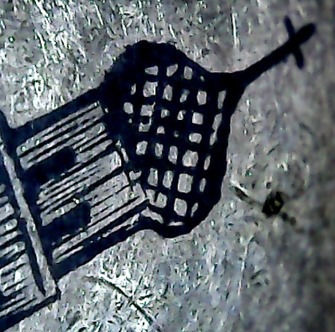
Simple facit: clumsy fakes!
Regards
Goldstein
Some striking details are immediately apparent:
The socalled "church"niello spoons consist always of 6 (12) different churches! On your spoons I can see at least 4 times the same church!
Marking is always on the stem side! See red arrows.
Here some correct spoons:


On your spoons the marks are on the wrong place and always incomplete in a significant way:


There is more to say but just a look at the chemical "instant"niello says it all!

Simple facit: clumsy fakes!
Regards
Goldstein
-
wesleytyler
- Posts: 14
- Joined: Fri Dec 29, 2017 1:27 am
- Location: Myrtle Beach SC
- Contact:
Re: Is this A trial kokoshnik, 1898 Russian Silver Hallmark?
Thank You, Everyone, for the time you gave this I very much appreciate it!
After 3 days of research, i knew Y'all were the folks that would know if they were anything real or fake.
I Agree I thought they were fakes.
i have some other items from the same lot ill post in a bit.
Thanks Again.
Wesley :)>
After 3 days of research, i knew Y'all were the folks that would know if they were anything real or fake.
I Agree I thought they were fakes.
i have some other items from the same lot ill post in a bit.
Thanks Again.
Wesley :)>
Re: Is this A trial kokoshnik, 1898 Russian Silver Hallmark?
wesleytyler.
Your spoons are absoiutely original russian spoons. Trust me.
Your spoons are absoiutely original russian spoons. Trust me.
Re: Is this A trial kokoshnik, 1898 Russian Silver Hallmark?
Hi Dad -
yes - but from the Indian/Chinese workshop!
Here some spoons from the same production, marks on the underside (red arrows), not legible, only empty prints! And of course the "instant" niello!
(Not engraved and filled - just "painted"! Maybe you should investigate some real pieces - not photos - before you give such firm statements!
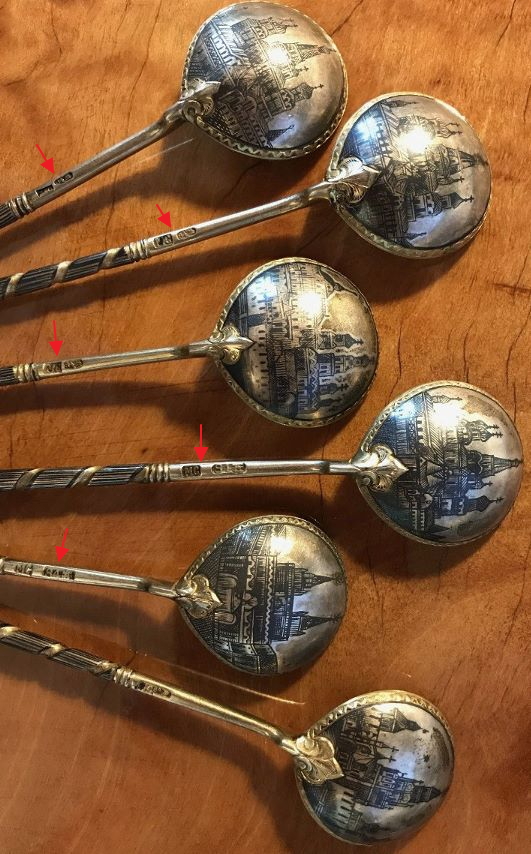

На здоровье!
Regards
Goldstein
yes - but from the Indian/Chinese workshop!
Here some spoons from the same production, marks on the underside (red arrows), not legible, only empty prints! And of course the "instant" niello!
(Not engraved and filled - just "painted"! Maybe you should investigate some real pieces - not photos - before you give such firm statements!


На здоровье!
Regards
Goldstein
Re: Is this A trial kokoshnik, 1898 Russian Silver Hallmark?
Hi Dad,
Could you please explain why you are sure the spoons are authentic Russian spoons?
Thanks for your cooperation.
Best,
Peter
Could you please explain why you are sure the spoons are authentic Russian spoons?
Thanks for your cooperation.
Best,
Peter
Re: Is this A trial kokoshnik, 1898 Russian Silver Hallmark?
Hi Dad -
another giveaway are the motives of the 6 spoons - it should be 6 different churches! The faker´s sets have always 3-4 identic churches in one set of 6. Also the stem´s are differently styled and decorated than the authentic ones. The gilding is lighter. Etc, etc.
Regards
Goldstein
another giveaway are the motives of the 6 spoons - it should be 6 different churches! The faker´s sets have always 3-4 identic churches in one set of 6. Also the stem´s are differently styled and decorated than the authentic ones. The gilding is lighter. Etc, etc.
Regards
Goldstein
Re: Is this A trial kokoshnik, 1898 Russian Silver Hallmark?
Niello means full engraving (deeper is better) and grooves filled with prefabricated black paste according to various formulas, fired and polished off until the black pattern (decor,image) appears in contrast to silver.
NOT superficial oxidation.
If inspected carefully under magnification one can recognize full engraving.
Cannot comment sets with the same views, but every set I have seen had different images of Kremlin.But I do not claim to have seen everything.
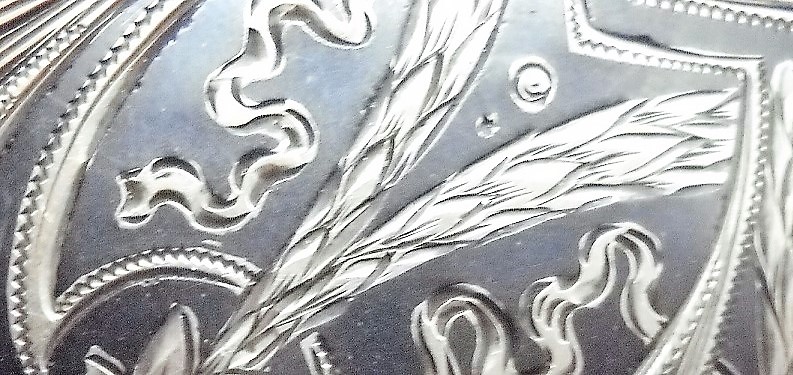
NOT superficial oxidation.
If inspected carefully under magnification one can recognize full engraving.
Cannot comment sets with the same views, but every set I have seen had different images of Kremlin.But I do not claim to have seen everything.

Re: Is this A trial kokoshnik, 1898 Russian Silver Hallmark?
The spoons are of dubious origin as I stated in the first place, no assayer, no town mark and the marks location...??? I share Goldstein's opinion, "instant niello" in other words painted black enamel color. It was very popular during the Soviet era. See picture below how painted enamel looks like. Painted even if there are some engravings to make it look like genuine niello but it isn't!!!!




Re: Is this A trial kokoshnik, 1898 Russian Silver Hallmark?
Hi -
to better understand the topic:
Technology
For the black mass, Cellini prescribes 1 ounce of silver, 2 ounces of copper and 3 ounces of lead, the older Theophilus 4/7 silver, 2/7 copper, 1/7 lead. The amount of sulfur is not specified. According to Pliny, the Egyptians should have made this mass of silver and sulfur in equal parts and 1/3 copper.
These constituents are to be repeatedly melted together until the black matter which breaks down into spheres on cooling shows a uniform structure. Then it is crushed and the metal to be polished, which has been moistened with water with a little borax, is completely covered with it. About glowing coals now the Niello is melted, but scraped away after cooling, so that only the recessed areas of the plate remain satisfied. Finally, the whole thing is sanded and polished. As a result, the black filled areas contrast with the shiny metal surfaces. Galvanoplastic Niello is produced in such a way that the metal objects are coated with etching base, engraved in the latter drawings and deepened by etching. The object is then placed in the electroforming apparatus until the depressed copper has filled in the features, washes the ground and grinds and polishes the surface.
Today the powder is ready to be bought in the specialized trade. Another possibility of the process: The powder is mixed with ammonia or alcohol to a fine pulp (water would start to boil when heated and the mixture from the recess hurl). This is introduced with a spatula in the wells, with a soft flame, the metal is heated, finally brought to a more pointed with the Niello. With a sharp needle, the small lead beads can be warped on the surface. If the workpiece is cold, the Niello can be filed flat, it must be noted that due to the lead content, the file may not be mixed with metallfiling, also separate tools should be used.
History
The Niellotechnik was already known in ancient Egypt and ancient Greece. The Niello was particularly popular in the Middle Ages, outstanding examples are the Tassilokelch and Paderborn Tragaltar of Roger von Helmarshausen. An outstanding master of the early Renaissance was Finiguerra in Florence around 1450.
Around 1885-1889, the Niello work had its headquarters in Russia. Most well-known were the silver tobacco cans made in Tula, but excellent works were also made in Vologda and Ustyug Veliki. A special application finds the Niello for black filling of the numerals and graduations of the minute circle on metal clock dials as well as for enameling gold watch cases.
Some classic examples - to show a few
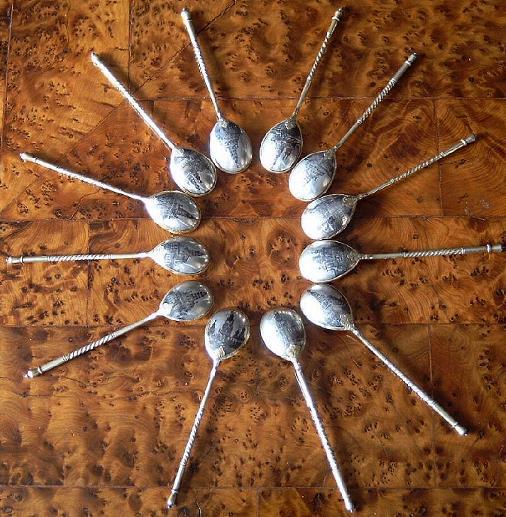
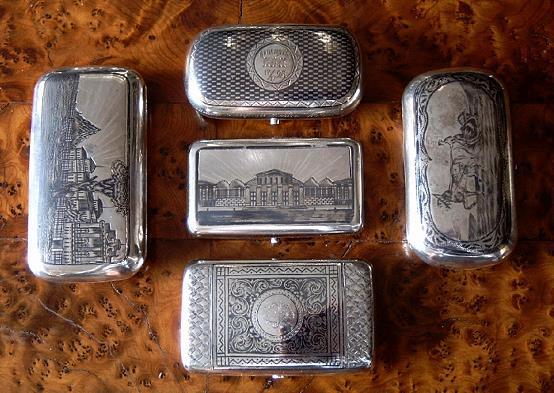
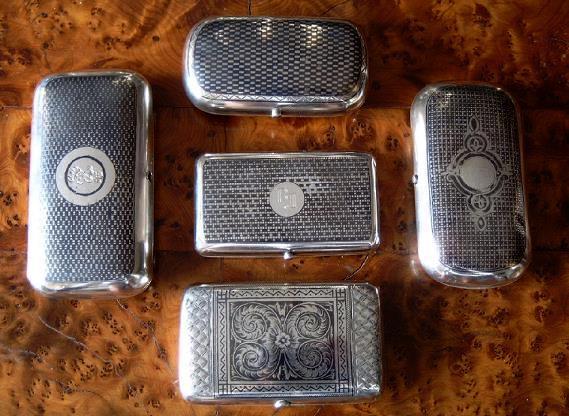
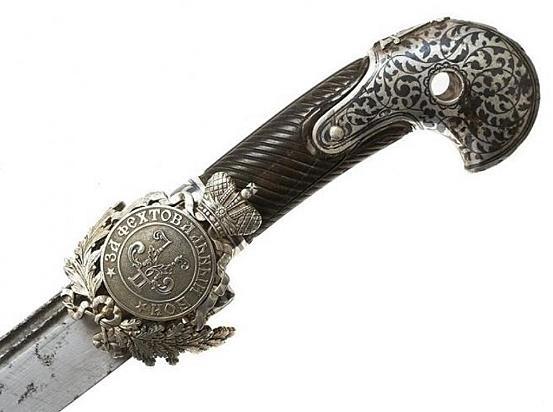
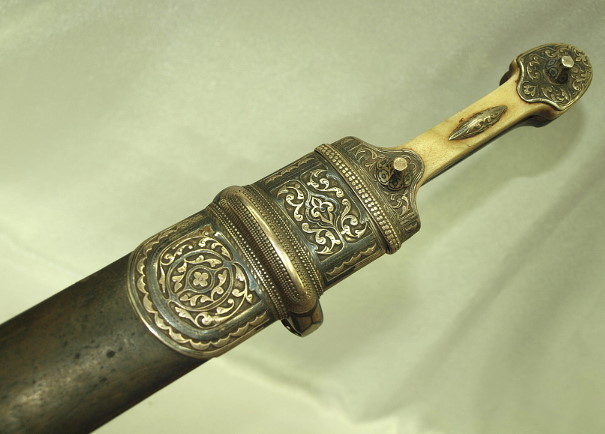

Some catalogue pages from Soviettime with the cheap, "instant" niello
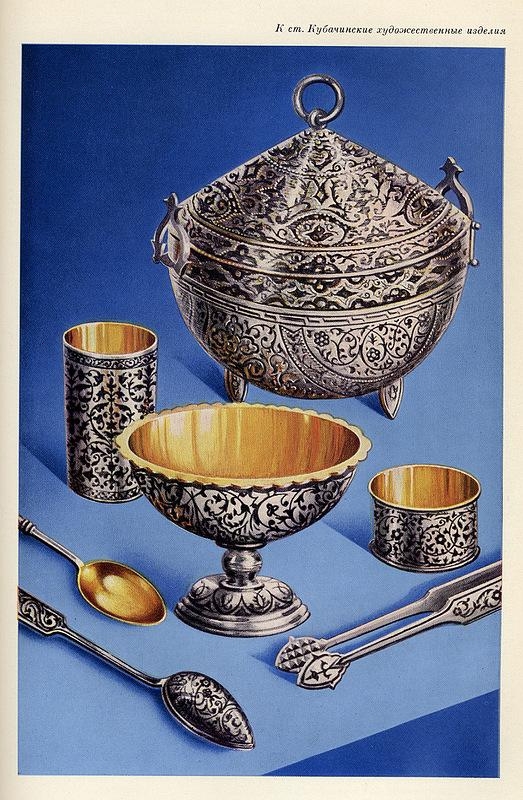
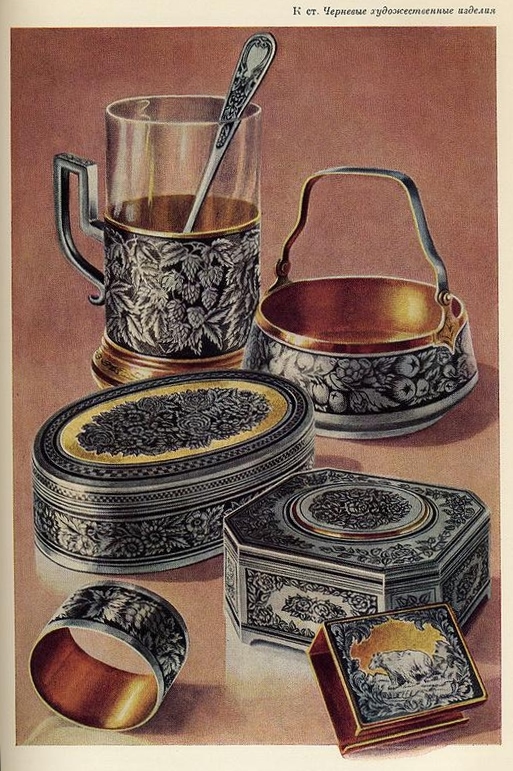
Regards
Goldstein
to better understand the topic:
Technology
For the black mass, Cellini prescribes 1 ounce of silver, 2 ounces of copper and 3 ounces of lead, the older Theophilus 4/7 silver, 2/7 copper, 1/7 lead. The amount of sulfur is not specified. According to Pliny, the Egyptians should have made this mass of silver and sulfur in equal parts and 1/3 copper.
These constituents are to be repeatedly melted together until the black matter which breaks down into spheres on cooling shows a uniform structure. Then it is crushed and the metal to be polished, which has been moistened with water with a little borax, is completely covered with it. About glowing coals now the Niello is melted, but scraped away after cooling, so that only the recessed areas of the plate remain satisfied. Finally, the whole thing is sanded and polished. As a result, the black filled areas contrast with the shiny metal surfaces. Galvanoplastic Niello is produced in such a way that the metal objects are coated with etching base, engraved in the latter drawings and deepened by etching. The object is then placed in the electroforming apparatus until the depressed copper has filled in the features, washes the ground and grinds and polishes the surface.
Today the powder is ready to be bought in the specialized trade. Another possibility of the process: The powder is mixed with ammonia or alcohol to a fine pulp (water would start to boil when heated and the mixture from the recess hurl). This is introduced with a spatula in the wells, with a soft flame, the metal is heated, finally brought to a more pointed with the Niello. With a sharp needle, the small lead beads can be warped on the surface. If the workpiece is cold, the Niello can be filed flat, it must be noted that due to the lead content, the file may not be mixed with metallfiling, also separate tools should be used.
History
The Niellotechnik was already known in ancient Egypt and ancient Greece. The Niello was particularly popular in the Middle Ages, outstanding examples are the Tassilokelch and Paderborn Tragaltar of Roger von Helmarshausen. An outstanding master of the early Renaissance was Finiguerra in Florence around 1450.
Around 1885-1889, the Niello work had its headquarters in Russia. Most well-known were the silver tobacco cans made in Tula, but excellent works were also made in Vologda and Ustyug Veliki. A special application finds the Niello for black filling of the numerals and graduations of the minute circle on metal clock dials as well as for enameling gold watch cases.
Some classic examples - to show a few






Some catalogue pages from Soviettime with the cheap, "instant" niello


Regards
Goldstein
Re: Is this A trial kokoshnik, 1898 Russian Silver Hallmark?
Hello.
All of you are very good and
interesting people. With the Coming Christmas Holiday! ))
I don't see the reasons to call these spoons a fake. Such spoons were fashionable at the end of the 19th century. It were made by many silversmiths: Ashmarin, Semyonov (and his daughter) and etc. Were expensive execution, were cheap. Different.
Sometimes spoons were on sale only with one type of the drawing.
Goldstein, 12 your spoons have 6 types of the drawing only.
These are the real niello – the engraved drawing with black "enamel". Hallmarks looks normal.
You don't even know the size of spoons. ))
Look my spoons (Vasily Ashmarin, 13 cm/22 gm)


All of you are very good and
interesting people. With the Coming Christmas Holiday! ))
I don't see the reasons to call these spoons a fake. Such spoons were fashionable at the end of the 19th century. It were made by many silversmiths: Ashmarin, Semyonov (and his daughter) and etc. Were expensive execution, were cheap. Different.
Sometimes spoons were on sale only with one type of the drawing.
Goldstein, 12 your spoons have 6 types of the drawing only.
These are the real niello – the engraved drawing with black "enamel". Hallmarks looks normal.
You don't even know the size of spoons. ))
Look my spoons (Vasily Ashmarin, 13 cm/22 gm)


Re: Is this A trial kokoshnik, 1898 Russian Silver Hallmark?
Yes Dad, but kindly show the marks on your spoons and do note the location of them; on the side of the stem as Goldstein pointed out earlier.
Re: Is this A trial kokoshnik, 1898 Russian Silver Hallmark?
Dad`s spoons differ in details.The same view but not exactly the same.
Re: Is this A trial kokoshnik, 1898 Russian Silver Hallmark?
Hi Dad -
Here some of the different spoon models on the market - more is in preparation....
Please look close - some details appear again and again on all models! Check the marks and if the makers worked in niello....
All the niello is "instant" niello..the gilding is yellowish like straw....
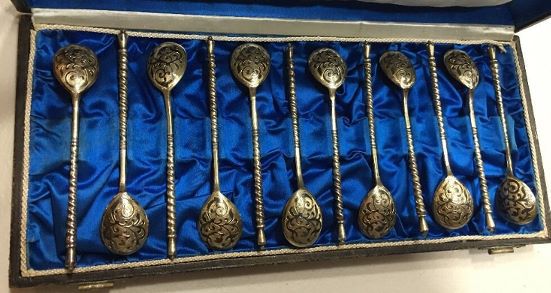
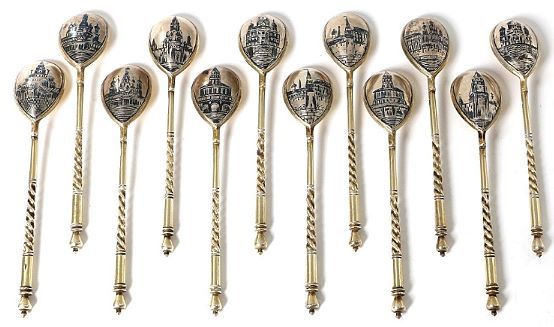

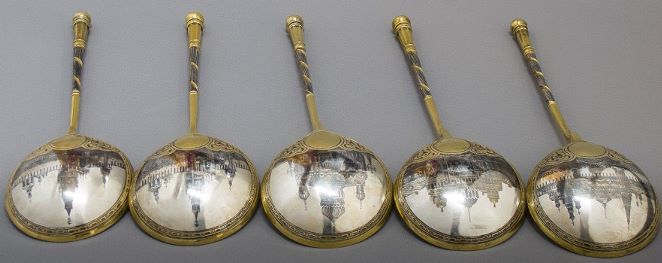

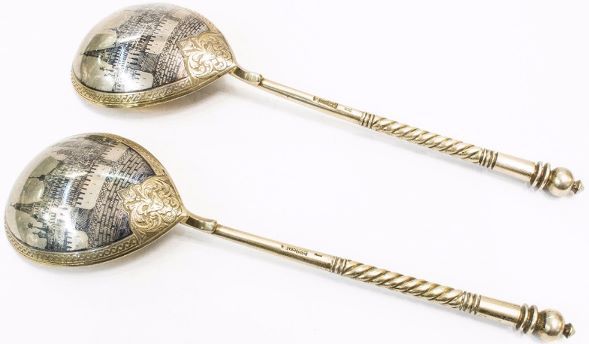

Regards
Goldstein
OK - maybe it was too difficult: divide 12 by 6 = 2! 2 sets of 6 spoons each = 12 spoons.Dad wrote:Goldstein, 12 your spoons have 6 types of the drawing only.
Here some of the different spoon models on the market - more is in preparation....
Please look close - some details appear again and again on all models! Check the marks and if the makers worked in niello....
All the niello is "instant" niello..the gilding is yellowish like straw....







Regards
Goldstein
